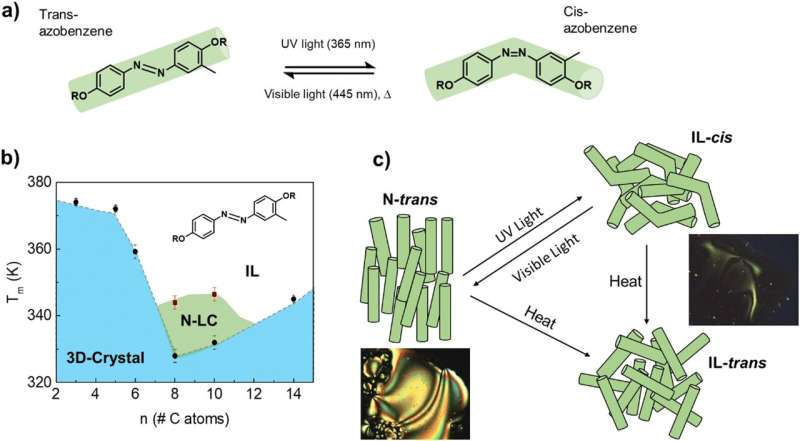Controlling thermal conductivity in liquid crystals

Doping a liquid crystal with azobenzene molecules can induce reversible changes in its thermal conductivity under light irradiation. These findings have been reported in a new collaboration between the Center for Research in Biological Chemistry and Molecular Materials (CiQUS) groups and is now featured on the cover of the Journal of Materials Chemistry C.
Current challenges in this topic such as thermal dissipation in microelectronics, necessary to prevent devices from overheating, can be addressed by designing new functional materials with tunable thermal conductivity. Liquid crystals are a very interesting family of materials, with appealing applications such as LCD screens.
The new study shows that azobenzene molecules can be used to control the thermal conductivity of liquid crystals using ultraviolet light.
“Azobenzenes are a class of molecules whose structure changes with light, so that when added into a liquid crystal, the transport of heat through the whole system can be modified by irradiating it with ultraviolet light,” says Noa Varela, Ph.D. student at CiQUS and first author of the study. “Depending on the molecular arrangement of the liquid crystal, either a increase or decrease of the thermal conductivity can be achieved upon illumination, at room temperature.”
Given the huge variety of available liquid crystals, the work arisen from the synergy between F. Rivadulla and M. Giménez groups opens up new possibilities for unlocking the future of thermal conductivity manipulation by innovative design of azobenzene molecules for precision switching.
More information:
Noa Varela-Domínguez et al, Light-induced bi-directional switching of thermal conductivity in azobenzene-doped liquid crystal mesophases, Journal of Materials Chemistry C (2023). DOI: 10.1039/D3TC00099K
Provided by
Center for Research in Biological Chemistry and Molecular Materials (CiQUS)
Citation:
Controlling thermal conductivity in liquid crystals (2023, April 17)
retrieved 18 April 2023
from https://phys.org/news/2023-04-thermal-liquid-crystals.html
This document is subject to copyright. Apart from any fair dealing for the purpose of private study or research, no
part may be reproduced without the written permission. The content is provided for information purposes only.
For all the latest Science News Click Here
For the latest news and updates, follow us on Google News.

